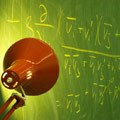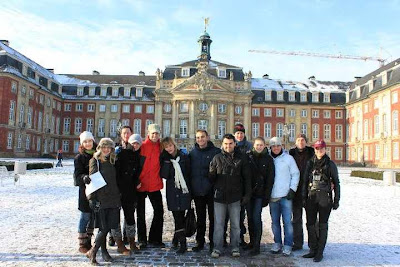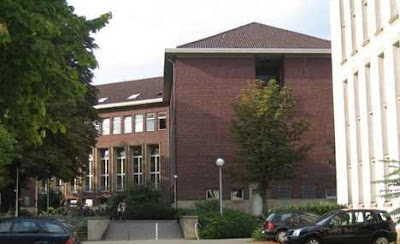Munster University
| Westphalian Wilhelms-University of Munster | |
|---|---|
| Westfälische Wilhelms-Universität Münster | |
 The Schloss: the centre of administration and the symbol of the university. | |
| Established | April 16, 1780 |
| Type | Public university |
| Chancellor | Dr. Stefan Schwartze |
| Rector | Prof. Dr. Ursula Nelles |
| Admin. staff | 13,000 (As of 2004[update]) |
| Students | 40,000 (As of 2004[update]) |
| Location | Münster, Germany |
| Campus | Urban, 285 buildings (2003), yearly expenses ~ 1 billion US dollars |
| Website | http://www.uni-muenster.de/en/ |
 | |
The University of Münster is a public university located in the city of Münster, North Rhine-Westphalia in Germany. The WWU is part of the Deutsche Forschungsgemeinschaft, a society of Germany's leading research universities. The WWU has also been successful in the German "Excellence Initiative".
With more than 40,000 students and over 130 fields of study it is Germany's third largest university and one of the foremost centers of German intellectual life. The university offers a wide range of units (e.g. Business, Geography, IT, Mathematics and many more) and several courses in English (e.g. PhD/Doctorate, Masters in Geoinformatics, Geospational Technologies or Information Systems).
The university is associated with nine Gottfried Wilhelm Leibniz Prize (most prestigious as well as most-funding prize in Europe), two Nobel prize (one former student and one professor) and one Fields Medal winners as professors and many more from former students.
History
The University has its roots in the Jesuiten-Kolleg Münster, which was founded in 1588. But today's University of Münster was founded in 1780 with four faculties: Law, Health Science (Medicine), Philosophy and Theology. The ceremony of constitution was performed by Franz Freiherr von Fürstenberg. In 1805 the university was extended to the Prussian University of Westphalia. It got its current name from Emperor Wilhelm II in 1907: Westfälische Wilhelms-Universität (WWU).
Organization
- Faculty of Protestant Theology
- Faculty of Catholic Theology
- Faculty of Law

- Faculty of Economics (Muenster School of Business Administration and Economics)
- Faculty of Health Science (Medicine and Dental Medicine)
- Faculty of Philosophy
- Faculty of Educational and Social Science
- Institute of Communication Science (IfK) (PR, Journalism, Media Science)
- Faculty of Psychology and Sport Science
- Faculty of History/Philosophy
- Faculty of Philology
- Faculty of Natural Science and Mathematics
- Faculty of Mathematics and Computer Science
- Faculty of Physics
- Faculty of Chemistry and Pharmacy
- Faculty of Biology
- Faculty of Earth Science
- Faculty of Music (Musikhochschule Münster)
FACULTIES AND DEPARTMENTS
- Dep. 1: Protestant Theology
- Dep. 2: Roman Catholic Theology
- Dep. 3: Law
- Dep. 4: Economics
- Dep. 5: Medicine
- Dep. 6: Education and Social Studies
- Dep. 7: Psychology and Sport and Exercise Sciences
- Dep. 8: History/Philosophy
- Dep. 9: Philologies
- Dep. 10: Mathematics and Computer Sciences
- Dep. 11: Physics
- Dep. 12: Chemistry and Pharmacy
- Dep. 13: Biology
- Dep. 14: Geosciences
- Dep. 15: Music Department
Research
Main areas of research
In addition to the focus on research into Religion and Politics there are numerous other internationally renowned areas in which Münster University carries out top-level research, for example in Planetology, Life sciences, Network research and Chemistry or Mathematics.
Doctoral degrees at Münster University
 Münster University supports its junior academics as much as it can. Once a supervisor has been found for a doctoral thesis the next step is to apply to the University and enrol. Research Training Groups and funding programmes can help to finance the time when the thesis is being written.
Münster University supports its junior academics as much as it can. Once a supervisor has been found for a doctoral thesis the next step is to apply to the University and enrol. Research Training Groups and funding programmes can help to finance the time when the thesis is being written. Partners
Münster University has strong partners in the fields of research and business. Affiliated institutes, cooperation partners such as the Max Planck Institute of Molecular Biomedicine and endowed professorships in various fields, such as battery research – all of these are extremely valuable for the success of work done at a research university. At the same time Münster University sees itself as a strong partner for the local region around it. The "Münsterland Expedition" is a current example of this.
Doctoral degrees
Information on Doctoral Degrees
Doctoral degree courses
There are numerous doctoral degree courses at Münster University for which anyone interested can enrol, provided they fulfil the relevant requirements.
List of doctoral degree courses :
List of doctoral degree courses :
Structured doctoral degree programmes
There are numerous options available to young researchers who wish to take a doctoral degree at Münster University, including many structured doctoral degree programmes in various fields.
Information on structured doctoral degree programmes :
Information on structured doctoral degree programmes :
For a university, attracting and retaining young, high-potential researchers is an important element in creating a strong profile. So Münster University sees one of its duties in creating an environment which offers the best possible conditions for allowing young researchers’ creativity to flourish and their academic careers to develop.
Doctoral degree courses: applications and enrolment
Anyone interested can apply to be accepted on a doctoral degree course at Münster University with their own individual PhD thesis title. The relevant university department decides on acceptance. There are deadlines and special requirements to be observed when enrolling.
Advice and support
Doctoral students are given advice and support by several institutions. Questions on content can be answered by study advisers, while the International Office assists international academics in enrolling. Help with administrative and organizational matters is provided by the Registrar´s Office.(http://www.uni-muenster.de/en/international_students/doctoral/advice/index.html) here for contacts
Financial support for doctoral degree courses
Doctoral students can get financial support from a variety of sources. Münster University itself offers a full scholarship for particularly qualified junior academics.Points of interest
- Botanischer Garten Münster, the university's historic botanical garden
Student life
The University of Münster offers a very active student life. Student organisations such as AIESEC, AEGEE, MOVE, MTP and many more are well represented and usually have a high number of members. A wide range of language courses is also offered (UNIcert). The city of Münster itself has a very active night life with over 1.000 bars, discothèques and clubs and the city of the Peace of Westphalia also has - of course - a very rich cultural life.
Notable alumni
Students
- Wolfgang Clement, Politician
- Johannes Georg Bednorz, Nobel Prize winner (1987)
- Dr. Andreas Raymond Dombret, Münster School of Business Administration and Economics, Member of the Executive Board of the Deutsche Bundesbank[2]
- Prof. Dr. Gerd Faltings, Mathematician, Fields Medal
- Prof. Dr. Dieter Fenske, Chemist
- Birgit Fischer, Athlete
- Kai Diekmann, Chief Editor of "Bild", Europe's largest newspaper (3.5 million copies)
- Dr. August Hanning, President of the Bundesnachrichtendienst
- Dr. Dr. Gustav Heinemann, Politician, former President of Germany
- Prof. Dr. Dr. h.c. mult. Friedrich Hirzebruch, Mathematician
- Prof. Dr. Thomas Hoeren, intellectual property judge and lawyer
- Jens Lehmann, footballer (goal keeper) of the German Football Team
- Ursula von der Leyen, Doctor, Federal Minister of Labour and Social Affairs, MP in the Deutscher Bundestag
- Niklas Luhmann, Sociologist
- Ulrike Marie Meinhof, member of the Red Army Faction
- Gilmar Mendes President of Brazilian Supreme Federal Court
- Frank Mattern, Münster School of Business Administration and Economics, Director Germany McKinsey
- Dr. Thomas Middelhoff, Board of Directors Bertelsmann
- Prof. Dr. Georg Milbradt, Minister-President of Saxony
- Walter Momper, Politician
- Ruprecht Polenz, Politician
- Dr. Kurt Schumacher, Politician
- Dr. h.c. Rudolf Seiters, Politician
- Prof. Dr. Hans-Werner Sinn, economist, President of the leading Institution for Economic Research (Instituts für Wirtschaftsforschung, IFO).
- Prof. Dr. Dr. h.c. Karl Stein, Mathematician
- Prof. Dr. Dr. h.c.mult. Hans Tietmeyer, Economist
- Klaus Töpfer, UNO-Commissar
- Ernst Tugendhat, Philosopher
- Prof. Dr. Karl Weierstrass, Mathematician
- Harald Weinrich, Classical Scholar
- Arthur Wieferich, Mathematician
- Heinrich August Winkler, Historian
- Dr. Klaus Zumwinkel, former Board of Directors Deutsche Post World Net
University lecturers
- Pope Benedict XVI
- Prof. Dr. Wilhelm Ackermann, Mathematician
- Prof. Dr. Kurt Aland, Theologian
- Prof. Dr. Karl Barth, Theologian
- Prof. Dr. Hans Blumenberg, (1920–1996) Philosopher
- Prof. Dr. Max Dehn, (1878–1952) Mathematician
- Prof. Dr. Gerhard Domagk, Nobel Prize in Medicine (1939)
- Prof. Dr. Heinz Gollwitzer, (1917–1999) Historian
- Prof. Dr. Bernhard Großfeld, International Business Law
- Prof. Dr. Klaus Hildebrand, Historian
- Prof. Dr. Paul Kevenhörster, Political scientist
- Prof. Dr. Wilhelm Killing, (1847–1923) Mathematician
- Prof. Dr. Paul Kirchhof, Jurist
- Prof. Dr. Dr. Johann Baptist Metz, Theologian
- Prof. Dr. Wolfgang Metzger, Psychologist
- Prof. Dr. Alfred Müller-Armack (1901–1978), Economist, Inventor of the Social Market Economy
- Prof. Dr. Friedrich Münzer, Classical Scholar
- Prof. Dr. Josef Pieper (1904–1997), Philosopher
- Prof. Dr. Karl Rahner (1904–1984), Theologian
- Prof. Dr. Bernhard Rensch (1900–1990), Biologist
- Prof. Dr. Helmut Schelsky (1912–1984), Sociologist
- Prof. Dr. Song Du-yul, Philosopher, former prisoner under South Korea's National Security Act
- Prof. Dr. Hans Wehr (1909–1981), Islam Scientist and Author of the leading Arabian-English dictionary (also used for Wikipedia guidelines).
Honorary Doctors
- Prof. Dr. Dr. h.c. Jan Assmann (D. theol. h.c. Faculty of Protestant Theology (1998))
- Prof. Dr. Dr. h.c. Arnold L. Demain, Biotechnology (2003 Department of Biology, Faculty of Natural Science and Mathematics)
- Prof. Dr. Dr. h.c. Ernst-Wolfgang Böckenförde, Judge, Bundesverfassungsgericht (2001 Faculty of Law)
- Prof. Dr. Dr. h.c. David A. O. Edward, Judge (2001 Faculty of Law)
- Prof. Dr. h.c. Gilberto Freyre Ph. D.
- Dr. h.c. Mikhail Gorbachev
- Dr. h.c. Manfred Gotthardt (2003 Faculty of Health Science (Medicine))
- Prof. Dr. Dr. h.c. Tomas Hammar, Political Scientist (2002 Faculty of Philosophy)
- Dr. h.c. Wim Kok, Prime Minister (Netherlands) (2003 Faculty of Philosophy)
- Dr. h.c. Hanna-Renate Laurien, Theologian (1996 Faculty of Catholic Theology)
- Prof. Dr. Dr. h.c. Robert Leicht, Reporter (2003 Faculty of Protestant Theology)
- Dr. h.c. Reinhard Mohn, Director Bertelsmann (2001 Faculty of Economics (Münster School of Business Administration and Economics))
- Dr. h.c. Rupert Neudeck
- Dr. h.c. Jean-Claude Juncker, Prime Minister (Luxembourg)
- Prof. Dr. Dr. h.c. Hubert Schmidbaur, Chemist (2005 Department of Chemistry and Pharmacy, Faculty of Natural Science and Mathematics)
- Dr. h.c. Erich Schumann, Jurist (2002 Faculty of Law)
- Dr. h.c. Wolfgang Thierse, Politician
- Dr. h.c. Tenzin Gyatso, 14th Dalai Lama (2007 Faculty of Chemistry and Pharmacy)
Photo of University






























































No comments:
Post a Comment